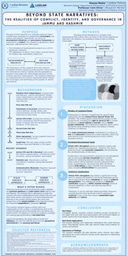Abstract for Summer 1 Research
Abstract
Often depicted as a power struggle between India and Pakistan, the Kashmir crisis is seen as a tug of war between the two nations deploying developmental ambitions in the quest for territorial control. Certainly, true for a state-centric analysis, this approach highlights the power dynamics essential for a territorial conflict, with nation-states being the main actors and rendering consequences on the areas they occupy. However, this discourse often overlooks a very crucial aspect of the crisis: its impact on the socio-political realities that exist within the Union Territory of Jammu and Kashmir, eerily similar to the nation’s colonial past. By addressing the conflict as an external manifestation of state power struggles, it often ignores the internal loss of agency and self-determination of the region’s inhabitants. As a result of this academic oversight, we fail to fully grasp the profound human implications of the seven-decade-long conflict. By downplaying the unique realities of the people of Jammu and Kashmir, academic discourse falls prey to a reductionist perspective, seeing the conflict as a binary struggle between India and Pakistan. Further, this monochrome of territorial contestation often sidelines the voices of the region during attempts at resolution. India and Pakistan, being cast as the primary actors, reduces the existence of the state’s inhabitants to the periphery, despite their lives being woven inseparably into the conflict’s fabric. Against this backdrop, the aim of my research is to explore the ways in which India and Pakistan employ development initiatives and post-colonial strategies as tools of control while hindering agency and self-determination in the region. I argue that these strategies do not merely adhere to the territorial dispute but also extend to forms of structural violence and suppression for the inhabitants of the region. By moving beyond the conventional understanding of this geopolitical conflict, my research aims to enter the realm of sociopolitical marginalization and disenfranchisement of the population. This research is backed by conducting approximately an hour-long semi-structured Zoom interview with two key stakeholders linked with any territorial conflict: a politician and a journalist. My aim for the rest of the summer will be to validate the facts stated by the interviewees using archival studies and reviewing current news from both local and international sources. This research is essential as it sheds light on the under-examined lived experiences of the state’s population, contributing a more nuanced narrative to the existing body of literature. These insights also carry the potential to change how policies are made regarding the Kashmir conflict, by addressing the humane challenge as its main concern, rather than the state-centric narrative that shuns any explanations beyond a national threat.


Please sign in
If you are a registered user on Laidlaw Scholars Network, please sign in